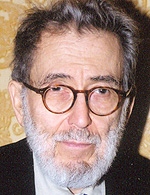Jazz critic and prolific author Nat Hentoff, who wrote for the edgy New York weekly The Village Voice for five decades, died in New York City Saturday at the age of 91.
His son, Nick Hentoff, announced the death on Twitter, saying his father died “surrounded by family listening to Billie Holiday.”
Hentoff was also known as a historian, novelist, and country music critic. He was the Voice’s jazz critic from 1958 to 2009, when he moved his music column to The Wall Street Journal.
The Boston native and son of Russian Jewish immigrants also was known as a civil libertarian, free speech activist, anti-death penalty advocate and pro-life advocate. While he supported Israel’s right to exist, he opposed Israel’s occupation of Palestinian territory.
Though he took a left-leaning view on many issues, in the 1980s he began embracing more socially conservative positions—including opposition to abortion and voluntary euthanasia. In an address to Americans United for Life in 1986, he said that he and the American Civil Liberties union “are in profound disagreement on the matters of abortion, handicapped infants and euthanasia, because I think they have forsaken basic civil liberties in dealing with these issues. I’m considered a liberal except for that unaccountable heresy of recent years that has to do with pro-life matters.”
In 2008, he had been prepared to support Barack Obama’s presidential candidacy, but his view changed after looking into Obama’s voting record on abortion.
“In Nat Hentoff’s world, speaking out against killing unborn babies took astonishing courage. He had it. So he did it,” Princeton professor Robert P. George commented in a Facebook post.
In 2005, Hentoff was honored by the Human Life Foundation at their third annual “Great Defender of Life” dinner. The foundation publishes the quarterly Human Life Review, to which Hentoff has contributed articles over the years.
“We lost a hero today, our Great Defender of Life 2005,” read a Facebook post from the foundation. “A great, good man. RIP.”
“Hentoff’s advocacy cuts a wide swath across what are often called ‘the life issues,’” anti-euthanasia activist Wesley J. Smith said in introductory remarks at the Human Life Review dinner. “Indeed, his unyielding stand over many years against abortion, infanticide, euthanasia, unethical human medical experimentation, and the ongoing bioethical construction of a ‘duty to die’ has made him a moral beacon for those who believe that universal human liberty depends on society’s embrace of the intrinsic equality of all human life.”
Hentoff wrote in The New Republic in 1992 that being pro-life has nothing to do with religion. “As any obstetrics manual–Williams Obstetrics, for example–points out, there are two patients involved, and the one not yet born ‘should be given the same meticulous care by the physician that we long have given the pregnant woman.’ Nor, biologically, does it make any sense to draw life-or-death lines at viability. Once implantation takes place, this being has all the genetic information within that makes each human being unique. And he or she embodies continually developing human life from that point on.”

